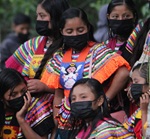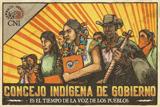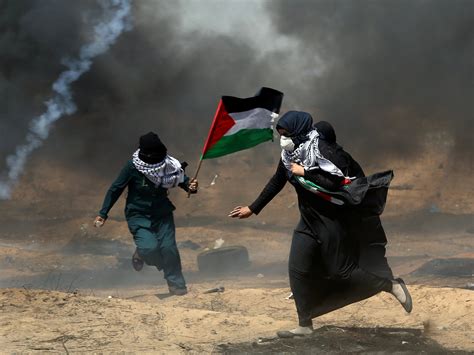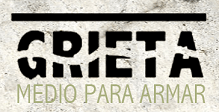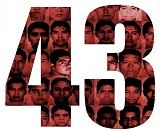Audio
Word of the relatives of prisoners on hunger strike in CERSS 5, San Cristobal, Chiapas
At a press conference in Frayba relatives of prisoners on hunger strike indefinitely talk about their encampment they have in front of Cathedral and demands freedom for the prisoners unfair.
En huelga de hambre adherentes a la Otra Campaña presos en la cárcel No. 5 San Cristóbal de Las Casas, Chiapas.
Political Prisoners Voice of Amate adherents to the EZLN’s Other Campaign and the Solidarity of the Voice of Amate, and prisoners adherents to the Other Campaign Mitzitón and political prisoner Innocent Voices, held in prison No. 5 San Cristobal de las Casas, Chiapas.
After enduring the injustices that caused us great harm to our families with these unjust imprisonments and prefabrication of the crimes have deprived us of our freedoms for the only cause and reason for some to defend the right and others as being devoid of any resource and illiterate, that our rights have been violated and continue to violate as many times we have been ignored in demanding justice from incompetent institutions.
That is why today we advertise that we take a joint decision to demonstrate our innocence through this that will start being 10.30 am this day September 29 this year where we declare 7 people on hunger strike are as follows:
1 .- Méndez Rosario Diaz: Political Prisoner “La Voz del Amate”
2 .- Pedro Lopez Jimenez Solidarity “La Voz del Amate”
3 .- José Diaz López: Solidarity “La Voz del Amate”
4 .- Alfredo López Jiménez: Solidarity “La Voz del Amate”
5 .- Alejandro Diaz Santis: Solidarity “La Voz del Amate”
6 .- Manuel Heredia Jiménez: Prisoner adherent to the Other Campaign Mitzitón
7 .- Juan Diaz Lopez: Political Prisoner Innocent Voices
And four people in plants and fasting from 12:00 hours on the grounds of illness and are:
1 .- Patishtán Alberto Gómez: Political Prisoner “La Voz del Amate”
2 .- Andres Nuñez Hernandez Solidarity “La Voz del Amate”
3 .- Rosa Lopez Diaz: Solidarity “La Voz del Amate”
4 .- Juan Jiménez Pérez: Prisoner adherent to the Other Campaign Mitzitón
Indefinite time as an end bearing demand true justice.
Therefore we demand that the C. Lic Juan Sabines Guerrero state governor to intervene immediately by our unconditional freedom belongs to us.
Finally invite colleagues and independent national and international organizations and centers of human rights NGOs to ensure our causes to demand justice and our freedoms and all political prisoners in the country.
Textos, audios, videos y fotos de la Brigada de Observación y Solidaridad con las Comunidades Zapatistas
AGOSTO 2011.
VINCULOS A LOS MATERIALES AUDIOVISUALES Y TEXTOS
TEXTOS
Informe General http://www.mediafire.com/myfiles.php#1yj6127m8u111,1
Realidad http://www.mediafire.com/?lmiia7cd2mn6a4f
Realidad Carta disculpa http://www.mediafire.com/?axo9b7yf07lg1xy
Realidad Entrev JBG http://www.mediafire.com/?l4bvsz5szxmsvat
Oventic Inf Corregido http://www.mediafire.com/?od9lpu8jlbwm0ps
Oventic Inf Final http://www.mediafire.com/?9l2vciznycl1p8c
Garrucha informe breve http://www.mediafire.com/?jl5ma1175ad81p8
Garrucha Informe largo http://www.mediafire.com/?p0668g4hst60xue
Morelia http://www.mediafire.com/?9ya1xao3uanthzb
VIDEOS
Morelia, Madre Tierra http://vimeo.com/29012975
Morelia, El Tulipán http://vimeo.com/29345117
Morelia, proyecto carretera 1enero http://vimeo.com/29345757
Morelia, Màrtires, http://vimeo.com/29441678
Morelia, 1 enero http://vimeo.com/29348137
Morelia, cras Madre Tierra http://vimeo.com/29404077
Morelia, Predio Doctor http://vimeo.com/29404457
Morelia, Comunidad Màrtires http://vimeo.com/29441678
Morelia, Región Che Guevara1 http://vimeo.com/29442945
Morelia, Región Che Guevara Incendio http://vimeo.com/29448562
Morelia, Región Che Guevara2 http://vimeo.com/29450300
Morelia, Cra denuncia en San Isidro http://vimeo.com/29488452
Morelia, JBG denuncia probl agrarios http://vimeo.com/29489546
Morelia, JBG, robo y ataque medios libres http://vimeo.com/29501770
La Realidad JBG http://vimeo.com/29586619
Morelia 1, presentación brigada http://vimeo.com/29807417
Morelia 2, denuncia agresiones http://vimeo.com/29808512
Garrucha, Carpeta con textos y audios http://www.mediafire.com/myfiles.php#b61225u3xmu25,1




